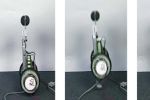Yamaha's Digital Grand Piano
Why reproduce in digital form something that's worked perfectly fine for hundreds of years as an analog device? That's the question I had for Yamaha about their new AvantGrand piano. The answer: So you can save five feet, 1,100 pounds, and $80,000.
Unlike, say, a digital SLR camera, the AvantGrand isn't meant to perform better than the traditional analog device. It's meant to perform exactly the same. But it makes that performance accessible to more people. Despite packing 16 amps and speakers, it's still a lot smaller (four feet long) and lighter (480 pounds) than the nine-foot, 1,500-pound, $100,000 grand piano it's meant to replace. And it's a lot cheaper to make, retailing for $19,000 when it hits the market this summer.
For feel, Yamaha retained the mechanics of a traditional piano. The AvantGrand has a full-scale "action" -- the keys, weights and hammers that would hit the strings on a regular piano. But instead, they hit a padded bar and pass by optical sensors that measure their speed so the synthesizer knows how loud a note to play. To simulate the vibration a player feels, the AvantGrand has two transducers under the keyboard. Strike a high note on the right-hand side, and you'll barely feel anything. Strike a low note over on the left, and it feels like the whole piano is reverberating. Yamaha also creates this feel, as well as sound, with an omnidirectional speaker right behind the keyboard.
So I asked: If he were blindfolded, would he know the difference? "Yes," he said, without hesitation. A real piano creates a more enveloping sound -- especially if you are playing it or standing right next to it. "But if you were blindfolded at the back of the room, you'd barely be able to tell," he quickly added.
At home, Cameron plays on a Yamaha Model C -- a six-foot piano selling for about $40,000. So then I asked the crucial, rubber-hits-the-road question: If the $19,000 AvantGrand had been available when you were on the market, would you have bought it? "Definitely!" he said, with a force that made me think he meant it.
1 Comment
Popular Tags
Regular Features

Featured
Gear & Gadgets
The MegaGoods Roundup
Our biggest collection yet: over 200 of the year's best gadgets, goods and gizmosBattle of the Ultra-Mobile Linux Laptops: Cloudbook vs. EeePC vs. My Old Thinkpad
How much portable Linux goodness can you get for $400?
Popular on Popsci
Most Viewed
Gear & Gadgets
- Yamaha's Digital Grand Piano
- Finger Flickin’ Good
- A Touch-Sensitive Rubik's Cube
- Welcome to Obsolescence. Population: Me
- How a Mouthguard Can Change a Game
- Energizer vs Duracell Rechargeable Batteries
- Argh! Tech Fights Back
- Nokia Releases New Set of Mobiles
- 5 Things You Forgot Your BlackBerry Can Do
- Dell's New Ultra-Thin Laptop and Inkless Printer
Most Commented
Gear & Gadgets
- 5 Things You Forgot Your BlackBerry Can Do
- Dell's New Ultra-Thin Laptop and Inkless Printer
- Telstra Boosts Wireless Broadband To 21Mbps (In Theory)
- Buying Vista Mid-Year Could Mean a Free Windows 7 Upgrade
- A Touch-Sensitive Rubik's Cube
- Five Best Live CDs
- Casio Protrek PRX-2000T Tracks Temps, Pressure, Altitude. Oh, and Time, Too
- Yamaha's Digital Grand Piano
- Finger Flickin’ Good
- Telstra Executive Loses Top Secret Microsoft Phone
Most Emailed
Gear & Gadgets
- A Touch-Sensitive Rubik's Cube
- Safari 4 Beta Adds Cover Flow, Runs '3x Faster' Than Firefox
- Microsoft's Interactive Omnidirectional Projector Puts You in the God Seat
- Mac Mini Inside an Apple Disk II Case
- Stolen Windows Mobile 6.5 Prototype Phone Wiped Remotely
- Five Best Live CDs
- Casio Protrek PRX-2000T Tracks Temps, Pressure, Altitude. Oh, and Time, Too
- Helmets Don't Stop Concussions
- Yamaha's Digital Grand Piano
- Finger Flickin’ Good









Comments
I wonder if its possible to replicate other instruments using this technology...although I can't think of any instrument as large as a grand piano that would warrant such a recreation! Nonetheless, this is a great invention for people who want something like the real thing but can't afford it or have the space for it.
1 out of 2 people found this comment helpful